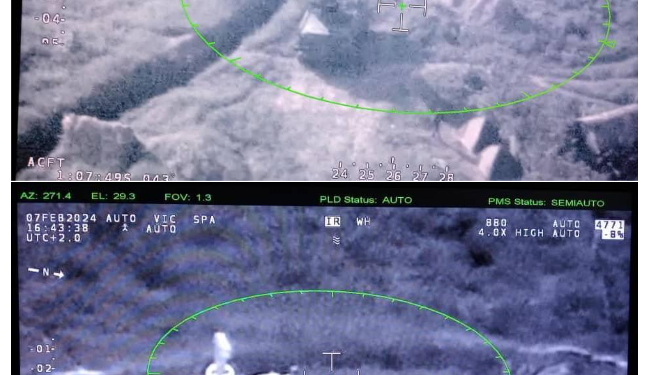By CHIMPREPORTS
Kigali has rejected calls from the United States to withdraw Rwandan forces and Surface-to-Air Missiles from the eastern Democratic Republic of Congo (DRC), asserting that it is taking measures to safeguard Rwanda from potential military strikes by Congolese forces.
Rwanda’s Foreign Affairs Ministry released a statement on Monday morning stating, “The Congolese political and military leadership, including President Félix Tshisekedi, has also repeatedly declared their intention to invade Rwanda and change its government by force.”
Rwanda emphasized that it considers these threats seriously and has adjusted its posture accordingly. The statement explained, “This includes measures to ensure the complete air defense of Rwandan territory and to degrade offensive air capabilities. These actions are in response to the introduction of advanced Chinese CH-4 attack drones by the DRC in 2023 and repeated violations of Rwandan airspace by Congolese fighter jets.”
On Saturday night, the United States condemned Rwanda’s support for the M23 armed group, urging the East African country to “immediately withdraw all Rwanda Defense Force personnel from the DRC and remove its surface-to-air missile systems, which threaten the lives of civilians, UN and other regional peacekeepers, humanitarian actors, and commercial flights in eastern DRC.”
This development occurs as Congolese forces, aided by troops from Tanzania, Malawi, and South Africa, engage in battles with M23 rebels on the outskirts of Sake, approximately 27 km from Goma.
Last week, the United Nations reported that on February 7, a UN observation drone was targeted by Surface-to-Air Missiles (SAM) fired from coordinates 0.0607S 29.2548E, approximately 15 miles northwest of Rutshuru, a region controlled by M23 rebels.

Rwanda’s strongly-worded statement highlights the escalating tensions between Rwanda and the Democratic Republic of Congo (DRC), signaling the potential for a full-scale armed conflict.
At the recent regional leaders’ mini-summit in Addis Ababa, DRC President Felix Tshisekedi firmly rejected the idea of engaging in talks with M23 rebels, emphasizing his dedication to defeating the rebels on the battlefield.
South Africa, having suffered the loss of 2 soldiers in a suspected mortar attack by M23 rebels last week, is now deploying 2,900 soldiers along with warplanes and artillery units to counter the insurgents. This move underscores the gravity of the situation and the increasing military involvement in the region.
Rwanda expressed deep concern today over the Democratic Republic of Congo’s abandonment of the Luanda and Nairobi Processes, coupled with what it perceives as the international community’s indifference to the DRC’s significant military buildup.
In its statement, Rwanda highlighted the DRC’s massive combat operations in North Kivu, which contravene regional decisions and appear to aim at expelling M23 and Congolese Tutsi civilians into neighboring countries. Rwanda also accused the DRC of collaborating with the Democratic Forces for the Liberation of Rwanda (FDLR), a Rwandan ethnic militia linked to the 1994 genocide against the Tutsi in Rwanda.
In response to the U.S. statement on Saturday, Rwanda stated it would seek clarification from the U.S. Government to determine whether the statement represents a sudden policy shift or a lack of internal coordination. Rwanda criticized the characterization of the FDLR as merely an “armed group named as a ‘negative force'” as a cynical act, questioning the United States’ credibility as a mediator in the Great Lakes Region.
President Tshisekedi recently ordered Congolese forces to cease all collaboration with the FDLR, resulting in the arrest of a commander who breached the presidential command.
Rwanda also claimed that recent M23 advances are a consequence of the DRC’s decision to expel the East African Community Regional Force in December 2023, which oversaw ceasefire and withdrawal efforts.
Amidst accusations from the DRC that Rwanda is supporting M23 rebels to create instability in the mineral-rich eastern DRC, Rwanda continues to deny these claims. The situation raises concerns about the potential for heightened tensions and conflict in the region.

Rwanda emphasized that safeguarding the rights and lives of Congolese Tutsi is the responsibility of the Democratic Republic of Congo (DRC), and the consistent failure to do so has exposed the entire Great Lakes Region to thirty years of conflict and instability.
The statement from Rwanda asserted, “Hundreds of thousands of Congolese Tutsi have lived as refugees in East Africa for decades, essentially forgotten. Hate speech and crude tribalism have become the currency of Congolese politics under the administration of President Félix Tshisekedi, and ethnic discrimination and targeted arrests and killings have become routine.” Rwanda further claimed that the Democratic Forces for the Liberation of Rwanda (FDLR) is fully integrated into the Congolese Armed Forces (FARDC), as documented by the UN Group of Experts.
Given these circumstances, Rwanda views these facts as a serious threat to its national security. The statement concluded by stating, “Because of that growing risk, Rwanda’s position is that the M23 issue must be resolved politically amongst Congolese. It will not be accepted for the problem to be externalized into Rwanda, by force, once again.” This underlines Rwanda’s insistence on a political resolution within the DRC rather than externalizing the issue through force.







Discussion about this post